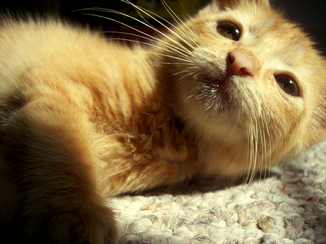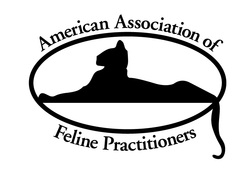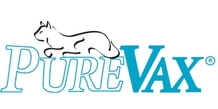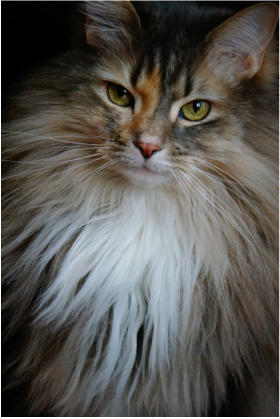Kitten Vaccinations

Getting your kitten vaccinated is one of the most important things you can do to keep her healthy and ensure she remains protected from the many viruses and bacteria she'll encounter in the environment during her first year. Even kittens that are indoor only are susceptible to becoming ill via the germs we bring home on our shoes and clothing.
When your kitten is first born, she ingests a special milk called colostrum, which her mother produces for a short time. This milk contains protective antibodies against disease. After a few days following her birth, your kitten's intestines become "closed" and are no longer able to absorb these antibodies into her system. These first two days are critical in determining the type of immunity she will have until her own immune system matures over the next 4 - 5 months.
While the protective antibodies from her mother are in effect, vaccinations your kitten receives will be inactivated and not have any effect. All of these protective antibodies will disappear by 16 - 20 weeks of age. The amount of time that the antibodies last in each kitten's system is variable, so your veterinarian vaccinates her every 2 - 4 weeks to make sure that your kitten doesn't have any window of time when she is vulnerable to disease! It is important to follow your vet's directions on when to return for vaccines. With the exception of Rabies, most vaccines need to be given at least twice (3 - 4 weeks apart) to provide maximum stimulation to the immune system and high levels of protective antibody protection in your kitten!
When your kitten is first born, she ingests a special milk called colostrum, which her mother produces for a short time. This milk contains protective antibodies against disease. After a few days following her birth, your kitten's intestines become "closed" and are no longer able to absorb these antibodies into her system. These first two days are critical in determining the type of immunity she will have until her own immune system matures over the next 4 - 5 months.
While the protective antibodies from her mother are in effect, vaccinations your kitten receives will be inactivated and not have any effect. All of these protective antibodies will disappear by 16 - 20 weeks of age. The amount of time that the antibodies last in each kitten's system is variable, so your veterinarian vaccinates her every 2 - 4 weeks to make sure that your kitten doesn't have any window of time when she is vulnerable to disease! It is important to follow your vet's directions on when to return for vaccines. With the exception of Rabies, most vaccines need to be given at least twice (3 - 4 weeks apart) to provide maximum stimulation to the immune system and high levels of protective antibody protection in your kitten!
What vaccines are available for
|
RABIES
Rabies is a virus transmitted through the saliva of affected animals, usually through bite wounds. By the time signs are noted, the disease is always fatal. Vaccinations are given between 12 - 16 weeks, then annually. In the northeast, Rabies is transmitted most commonly by raccoons, bats, skunks, foxes and groundhogs. In Maryland, there were 375 cases of Rabies confirmed by laboratory testing in 2013! Anne Arundel County had the 3rd highest rate of the 24 counties with 40 cases.
The Rabies vaccine is required by law, and must be given unless your pet has a special letter of exemption written by the state veterinarian (which can be issued in cases when the vaccine may be harmful to the pet; eg pets with autoimmune disease or cancer).
Rabies is a virus transmitted through the saliva of affected animals, usually through bite wounds. By the time signs are noted, the disease is always fatal. Vaccinations are given between 12 - 16 weeks, then annually. In the northeast, Rabies is transmitted most commonly by raccoons, bats, skunks, foxes and groundhogs. In Maryland, there were 375 cases of Rabies confirmed by laboratory testing in 2013! Anne Arundel County had the 3rd highest rate of the 24 counties with 40 cases.
The Rabies vaccine is required by law, and must be given unless your pet has a special letter of exemption written by the state veterinarian (which can be issued in cases when the vaccine may be harmful to the pet; eg pets with autoimmune disease or cancer).
FELINE LEUKEMIA INFORMATION COMING SOON
FELINE INFECTIOUS PERITONITIS INFORMATION COMING SOON
FELINE IMMUNODEFICIENCY VIRUS INFORMATION COMING SOON
When Should My Kitten Get Vaccinated?

The following recommendations have been presented by the
American Association of Feline Practitioners in 2013.
Not all kittens/cats have the same risk factors for viruses and bacteria, and therefore their recommendations for vaccination will vary based on their age, health, environment and lifestyle.
This information should be helpful in having an educated dialogue with your veterinarian about what vaccinations are best for your kitten.
American Association of Feline Practitioners in 2013.
Not all kittens/cats have the same risk factors for viruses and bacteria, and therefore their recommendations for vaccination will vary based on their age, health, environment and lifestyle.
This information should be helpful in having an educated dialogue with your veterinarian about what vaccinations are best for your kitten.
Panleukopenia + herpesvirus-1+ calicivirus (FPV, FHV-1, FCV). Modified-live and inactivated vaccines.
Recommended for: All cats.
Kittens (<16 weeks): Administer the first dose as early as 6 weeks of age, then every 3–4 weeks until 16–20 weeks of age
Adults (16+ weeks): Administer two doses, 3–4 weeks apart.
Re-vaccinate: 1 year after primary series; thereafter, boost every 3 years, lifelong.
Comments: Modified-live and inactivated vaccines are available for parenteral administration; in some countries intranasal vaccines are also available. For cats going into boarding or another high exposure, stressful situation, a booster 7–10 days prior to boarding maybe warranted, particularly if the cat has not been vaccinated in the preceding year.
Feline Leukemia (FeLV). Inactivated and recombinant.
Recommended for: All cats <1 year of age; cats >1 year that spend time outdoors or are in contact with cats that do (or cats that are of unknown FeLV status).
Kittens (<16 weeks): Administer two doses, 3–4 weeks apart, beginning as early as 8 weeks of age.
Adults (16+ weeks): Administer two doses, 3–4 weeks apart.
Re-vaccinate: Administer a single dose 1 year following administration of the initial two-dose series.
Comments: Results of several studies indicate that FeLV vaccine-induced immunity persists for at least 12 months following vaccination. Thereafter, the Advisory Panel recommends re-vaccination every 2 years for cats at low risk of infection and annually for cats at higher risk. A study by Jirjis et al suggests that DOI induced by some FeLV vaccines may last for at least 2 years. Another guidelines group (European Advisory Board on Cat Diseases) recommends that for cats older than 3–4 years of age, a booster vaccination every 2–3 years is sufficient. Test first to verify FeLV antigen-negative status. As kittens are more susceptible to progressive FeLV infection,and as the eventual environment into which a kitten will go can rarely be predicted with certainty, the Advisory Panel recommends routine FeLV vaccination for all kittens up to and including 1 year of age. At-risk adult cats should continue to be vaccinated against FeLV.
Rabies. Inactivated and recombinant.
Necessary for: all cats where legally mandated or in an endemic region.
Kittens (<16 weeks): Administer a single dose at not less than 12 weeks/3 months of age.
Adults (16+ weeks): Administer a single dose. Administer a single dose 1 year following the initial dose; then repeat annually (or every 3 years if using a vaccine licensed for this interval). Where rabies vaccination is required, the frequency of vaccination may differ from these recommendations based on local statutes or requirements. Veterinarians should be familiar with, and adhere to, local requirements.
Recommended for: All cats.
Kittens (<16 weeks): Administer the first dose as early as 6 weeks of age, then every 3–4 weeks until 16–20 weeks of age
Adults (16+ weeks): Administer two doses, 3–4 weeks apart.
Re-vaccinate: 1 year after primary series; thereafter, boost every 3 years, lifelong.
Comments: Modified-live and inactivated vaccines are available for parenteral administration; in some countries intranasal vaccines are also available. For cats going into boarding or another high exposure, stressful situation, a booster 7–10 days prior to boarding maybe warranted, particularly if the cat has not been vaccinated in the preceding year.
Feline Leukemia (FeLV). Inactivated and recombinant.
Recommended for: All cats <1 year of age; cats >1 year that spend time outdoors or are in contact with cats that do (or cats that are of unknown FeLV status).
Kittens (<16 weeks): Administer two doses, 3–4 weeks apart, beginning as early as 8 weeks of age.
Adults (16+ weeks): Administer two doses, 3–4 weeks apart.
Re-vaccinate: Administer a single dose 1 year following administration of the initial two-dose series.
Comments: Results of several studies indicate that FeLV vaccine-induced immunity persists for at least 12 months following vaccination. Thereafter, the Advisory Panel recommends re-vaccination every 2 years for cats at low risk of infection and annually for cats at higher risk. A study by Jirjis et al suggests that DOI induced by some FeLV vaccines may last for at least 2 years. Another guidelines group (European Advisory Board on Cat Diseases) recommends that for cats older than 3–4 years of age, a booster vaccination every 2–3 years is sufficient. Test first to verify FeLV antigen-negative status. As kittens are more susceptible to progressive FeLV infection,and as the eventual environment into which a kitten will go can rarely be predicted with certainty, the Advisory Panel recommends routine FeLV vaccination for all kittens up to and including 1 year of age. At-risk adult cats should continue to be vaccinated against FeLV.
Rabies. Inactivated and recombinant.
Necessary for: all cats where legally mandated or in an endemic region.
Kittens (<16 weeks): Administer a single dose at not less than 12 weeks/3 months of age.
Adults (16+ weeks): Administer a single dose. Administer a single dose 1 year following the initial dose; then repeat annually (or every 3 years if using a vaccine licensed for this interval). Where rabies vaccination is required, the frequency of vaccination may differ from these recommendations based on local statutes or requirements. Veterinarians should be familiar with, and adhere to, local requirements.

Note from PetDrChristy regarding Rabies vaccines in Cats:
Most veterinarians recommend using the PureVax Rabies vaccine, which is licensed for 1 year, but is preferred because it is non-adjuvanted. An adjuvant is a compound added to a vaccine to stimulate the immune system to react, and therefore make the vaccine more effective. Unfortunately, adjuvants are suspected of causing a type of cancer called fibrosarcoma at the site of the vaccine. The vaccine-related fibrosarcoma tumor is rare (1 in 10,000 cats) but is aggressive and difficult to treat. Many veterinarians feel that it is not worth the risk.
PureVax has recently released a 3 year non-adjuvanted Rabies vaccine (in 2014). This vaccine is three times as expensive as the 1 year vaccine. Because it is not identical to the original vaccine (it is an "amped up" version) and more expensive, it is not widely used at this time. At this point, in the clinics that have offered the 3 year vaccine, I have seen few clients select this option (given the economic climate and the fact that cats will be coming to the veterinarian for an annual examination regardless). Vaccines are expiring before they can be administered, and this leaves a large financial burden on the veterinarian given the expense of this particular vaccine. I do not foresee many clinics carrying this vaccine unless public demand increases.
Most veterinarians recommend using the PureVax Rabies vaccine, which is licensed for 1 year, but is preferred because it is non-adjuvanted. An adjuvant is a compound added to a vaccine to stimulate the immune system to react, and therefore make the vaccine more effective. Unfortunately, adjuvants are suspected of causing a type of cancer called fibrosarcoma at the site of the vaccine. The vaccine-related fibrosarcoma tumor is rare (1 in 10,000 cats) but is aggressive and difficult to treat. Many veterinarians feel that it is not worth the risk.
PureVax has recently released a 3 year non-adjuvanted Rabies vaccine (in 2014). This vaccine is three times as expensive as the 1 year vaccine. Because it is not identical to the original vaccine (it is an "amped up" version) and more expensive, it is not widely used at this time. At this point, in the clinics that have offered the 3 year vaccine, I have seen few clients select this option (given the economic climate and the fact that cats will be coming to the veterinarian for an annual examination regardless). Vaccines are expiring before they can be administered, and this leaves a large financial burden on the veterinarian given the expense of this particular vaccine. I do not foresee many clinics carrying this vaccine unless public demand increases.
